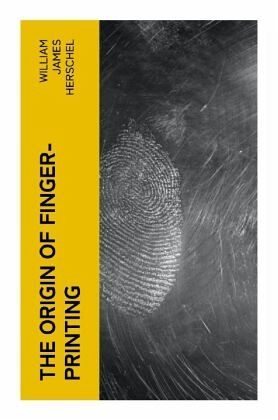
The Origin of Finger-Printing
Versandkostenfrei!
Versandfertig in 6-10 Tagen
8,00 €
inkl. MwSt.
Weitere Ausgaben:

PAYBACK Punkte
0 °P sammeln!
In "The Origin of Finger-Printing," William James Herschel presents a pioneering exploration of dactyloscopy, the scientific study of fingerprints. This seminal work delves into the historical context of fingerprinting, tracing its roots from ancient practices to its application in modern forensic science. Herschel's narrative is infused with meticulous observations and empirical data, revealing the intricate patterns of human skin as unique identifiers. His clear, logical prose embodies the rationalist spirit of the late 19th century, positioning the book at the intersection of science and la...
In "The Origin of Finger-Printing," William James Herschel presents a pioneering exploration of dactyloscopy, the scientific study of fingerprints. This seminal work delves into the historical context of fingerprinting, tracing its roots from ancient practices to its application in modern forensic science. Herschel's narrative is infused with meticulous observations and empirical data, revealing the intricate patterns of human skin as unique identifiers. His clear, logical prose embodies the rationalist spirit of the late 19th century, positioning the book at the intersection of science and law enforcement, ultimately revolutionizing criminal identification methods. William James Herschel, a British civil servant, was profoundly influenced by his experiences in India, where he first recognized the utility of fingerprints for personal identification. His fascination with this biological feature arose from a confluence of his varied interests in law, science, and anthropology, making him a forerunner in the application of fingerprinting for societal benefit. Herschel meticulously documented his findings, paralleling the growing acceptance of scientific innovations in legal contexts during his era. This book is essential reading for those interested in forensic science, criminology, and the history of identification methods. Herschel's insights not only laid the groundwork for modern fingerprinting techniques but also provoke critical reflections on privacy, identity, and the ethical dilemmas surrounding biometric data.













